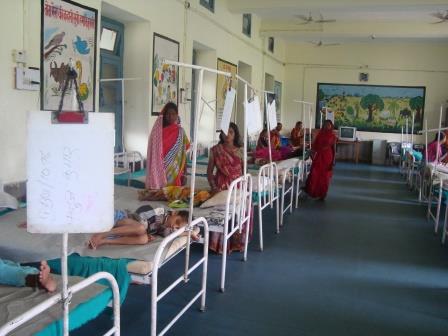Breathing new life
|

Twenty-five year old Durga has travelled 15 km from her village to get to Darbhanga (Bihar), the district headquarters, following the advice of the local auxiliary nurse and midwife (ANM). Her daughter Puja, who is 10 months old and severely malnourished, lies listless on her lap. At the Nutrition Rehabilitation Centre (NRC), Puja is at the right place, where hopefully she will be brought back from an extremely critical situation. For Durga, being at the NRC is also an opportunity to learn how to look after this child. Sadly, she lost her first born two years ago.
Conceived and operationalized by UNICEF in 2010 and now run by the Government of Bihar in collaboration with a non-governmental organization Nidan, the Darbhanga NRC has become the model for the State. Officials of the in Darbhanga NRC, say that the center's maintenance, cleanliness, quality of food provided to the mother and child; brightly painted walls that have pictorial messages for the mother; and basic television entertainment are among the reasons why this center has been successful. To date 1,116 children, who were on the verge of wasting away, have been to the center from not only from the immediate area of Darbhanga but from even further away.
Dr. Mahadev Chaudhary, District Immunization Officer in Darbhanga and medical officer in charge when the 20-bed NRC was set up, says “In the 20 days that the mother and child are at the NRC, we keep track of their diet. The mothers are provided health education - how to stay clean, how to keep the children clean, how to keep their environment clean. They are also encouraged to adopt better behavioral practices such as hand washing.”
A link worker, working closely with Accredited Social Health Activist (ASHA) and ANM look for malnourished babies in the villages adjoining Darbhanga district and they are brought to the NRC by the ASHA. Apart from the incentive to improve the health of the child, the mother is given Rs 100 ($2) a day for the 20 days she is at NRC with the child. The ASHA too gets an incentive of Rs 100 for each malnourished child she identifies and brings to the center.
Often times, when the infants are brought to the center, like Puja, they are debilitated, listless, and have a foul odor. Both mother and child are bathed, cleaned, and weighed on arrival. Each child is administered nutrition according to their weight. For the first seven days, children are put on a diet of milk, water, puffed rice powder, oil, and sugar. In the next seven days mashed potatoes are added to the diet. The targeted weight gain is 8 to 10 grams per kg of body weight per day. This weight gain target is achieved in 75 per cent of the cases. With this care, there is a dramatic improvement in the physical appearance within a few days of admission to the center. The aim is to try to help the child gain 1.5 to 2 kilograms by the time s/he leaves.
To monitor the progress, mother and child are expected to return after 15 days for the first check up, followed at 15-day intervals for two months. The majority of the malnourished children are from the poorest of the poor in Bihar.
Says Nidan's counselor, Richa Kumar, “We try our best to help mothers be able to take better care of their children even when they go back home. During the period that they are here we try to cover important topics - cleanliness, nutrition.” She adds that most of the women who have come to the center have had up to five children and are often from the most socioeconomically deprived communities of the State. Unfortunately, ten percent of the cases relapse into malnutrition, due to the absence of functioning Integrated Child Development Services (ICDS) facilities or parents' inability to access care in their villages.
Extremely acute cases of malnutrition are referred to the Malnutrition Intensive Care Unit (MICU) in the Darbhanga Hospital, which has 30 beds and the medical equipment to deal with very sick children. This unit has recently been set up by Medicine Sans Frontier (MSF). Each batch of the 20 children admitted at the NRC has three to four children who are very sick and sent to the MICU.
UNICEF social mobilization coordinator Chandra Bhushan Kumar recalls a child, like Puja, that he still keeps track of, who was brought to the NRC in a critical situation a few years ago. Today Kumar says, not only is the child alive and healthy, but the mother keeps the child clean and works to provide basic nutrition from the resources available to her despite the challenge of poverty. That is why Puja is at the right place at the right time.














